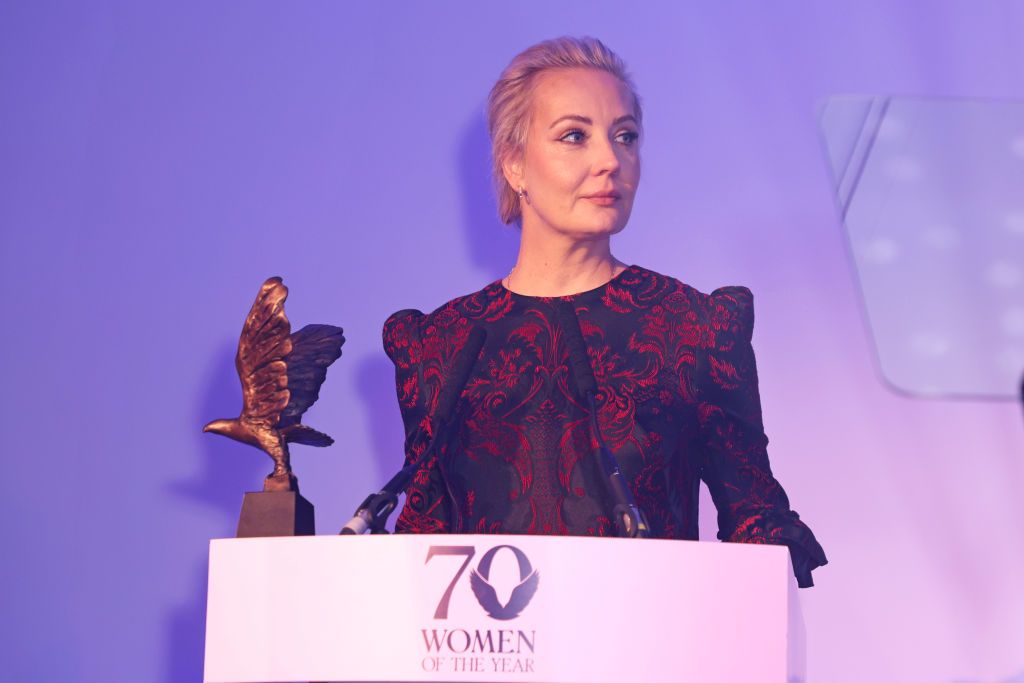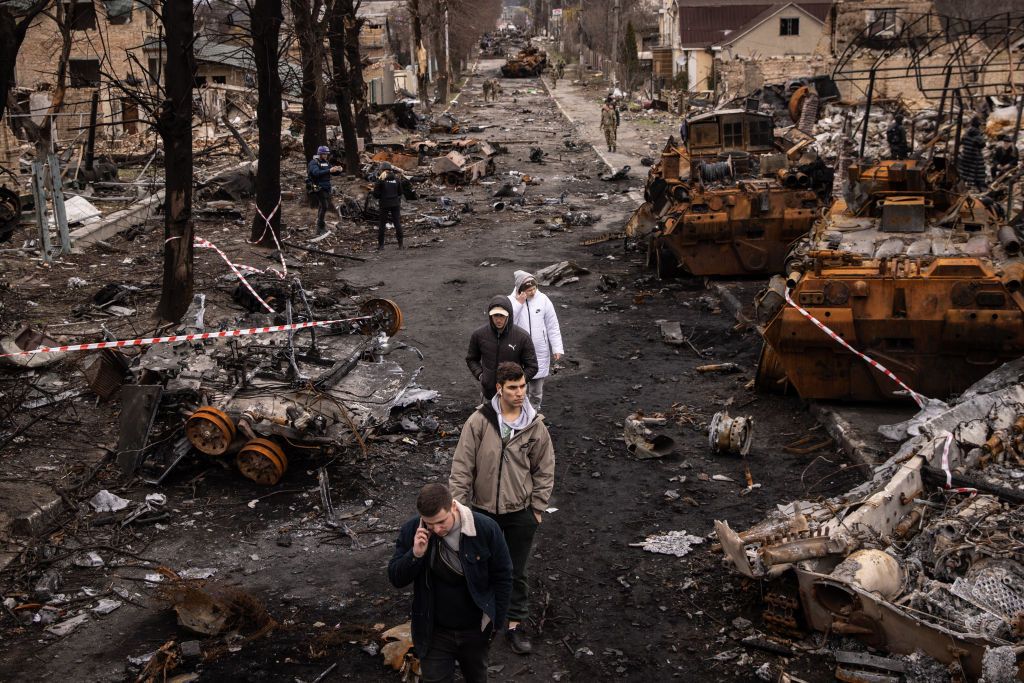Opinion: Pakistan can’t walk the tightrope between Russia and the West forever
Pakistan’s growing ties with Russia mirror its long-standing strategy with China, balancing diplomatic, military, and economic support while preserving key Western relations.

Russian President Vladimir Putin (L) walks alongside Pakistani Prime Minister Shehbaz Sharif during the Sixth Summit of Conference on Interaction and Confidence Building Measures in Asia (CICA) in Astana, Kazakhstan, on Oct. 13, 2022. (Ramil Stidikov/SPUTNIK/AFP via Getty Images)

Aisha Ryan
Programs and partnerships manager at Adam Smith International
Imran Khan, cricket star and then-prime minister of Pakistan, visited Russia on Feb. 23-24, 2022 – the first visit by a Pakistani leader to Russia in over two decades. On the second day of his visit, Russia launched its full-scale invasion of Ukraine.
Some political analysts suspected that Khan’s visit was simply another impulsive move, made without consulting experienced policymakers. However, two and a half years and two prime ministers later, Pakistan’s relationship with Russia continues to warm.
In September, Russian Deputy Prime Minister Alexei Overchuk visited Pakistan, where he met with Pakistani Prime Minister Shehbaz Sharif and held a joint press conference with Pakistani Foreign Minister Mohammad Ishaq Dar, announcing intentions to improve economic cooperation and bilateral trade.
In a context where Russia is increasingly alienating itself from the global community due to its war in Ukraine, why is a large, developing South Asian country so keen on rapprochement?
"In a context where Russia is increasingly alienating itself from the global community due to its war in Ukraine, why is a large, developing South Asian country so keen on rapprochement?"
Pakistan and Russia have never been particularly close allies, but they have been inching closer in recent years. This warning relationship is marked by their signing of a bilateral defense coordination agreement in 2014 and Russia’s support for Pakistan joining the Shanghai Cooperation Organization in 2017.
Pakistan also accepted Russia’s invitation to join Russian President Vladimir Putin’s International North-South Transport Corridor, which Putin envisions stretching from Europe to the Middle East and India – a new Silk Road or a competing Belt and Road Initiative. Security cooperation has also ramped up, with joint military exercises in 2016 and 2018.
This reflects the convergence of Russo-Pakistani interests. First, the Kremlin is looking to Islamabad for support in tackling violent extremism on its periphery, particularly related to the instability created by the wars in Afghanistan.
Secondly, Putin and some Pakistani leaders share similar views on freedom of speech; blasphemy is a capital crime in Pakistan, and Khan previously expressed gratitude to Putin for speaking out in support of respect for the Prophet Muhammad (Peace Be Upon Him).
Finally, economic interests tie the two countries together. Pakistan is experiencing an energy crisis, while Russia is seeking more buyers for its oil.
In contrast, Pakistan’s relations with Ukraine have been more limited. After independence, Pakistan and Ukraine established ties quickly, but these have been restricted to minor military, economic, and trade cooperation – particularly Pakistan’s purchase of defense equipment.
However, this relationship has been growing, with both sides investing more energy in defense production collaborations and joint ventures. Ukraine has also become a major wheat exporter to Pakistan, with nearly 1.4 million metric tons of wheat imported from Ukraine in 2020-2021.

With the outbreak of war, Pakistan’s geopolitical trajectory in Eastern Europe has not changed significantly because the underlying drivers shaping its relationships with Russia and Ukraine remain the same. Underpinning its energy needs, food security concerns, and political ties is the necessity of building relationships that offer Pakistan stability and security amid considerable regional competition.
Pakistan was created in 1947 when the British Raj was divided into India and Pakistan (and modern-day Bangladesh). Pakistan has gone to war with India several times, and the insecurity it feels from India on its eastern border remains one of its greatest existential threats and a significant driver of its politics and security calculations.
Today, Indo-Pakistani relations are stable, as both countries have more pressing issues to address, but competition remains intense. Notably, Indian Prime Minister Narendra Modi is currently focused on strengthening regional ties. India also maintains a much stronger strategic and economic relationship with Russia, which is deeper than Pakistan’s, and it has robust and growing ties with the United States.
To Pakistan’s west lies Afghanistan. For many years, Pakistan was a key regional partner for the U.S., which used it as a base for operations in Afghanistan. This partnership ensured significant U.S. investment in Pakistan, including military training, equipment, and substantial aid. Today, the countries have stable ties, but the U.S. has less incentive to support the Pakistani state beyond the bare minimum.
Nevertheless, the U.S. remains a key trade partner and source of aid, particularly through the International Monetary Fund (IMF), so Pakistan cannot afford to alienate them. This may explain Pakistan’s multiple statements supporting Ukraine’s territorial integrity and sovereignty, the first of which came the day before Khan’s visit to Moscow.
Finally, to Pakistan’s northeast is China. China has a strong presence in Pakistan through trade, investment, and development aid delivered in coordination with the China-Pakistan Economic Corridor (CPEC). However, China faces security challenges in Pakistan, particularly regarding terrorism in Balochistan, and it is also concerned about the country’s economic instability.
Pakistan’s political and military leadership now face the challenge of balancing the need to maintain these relationships and fulfill competing interests without alienating any allies. The U.S. is particularly wary of Pakistan’s growing ties with China and Russia, but Pakistan feels compelled to pursue alternative relationships as American aid has fallen far short of previous levels.
"Pakistan’s political and military leadership now face the challenge of balancing the need to maintain these relationships and fulfill competing interests without alienating any allies."
Pakistan’s burgeoning relationship with Russia represents a newer attempt to replicate what it has been doing with China for years. The country is trying to secure diplomatic, military, and economic support from Russia without jeopardizing its currently more important relations with the West.
Going forward, Pakistan’s current leadership is giving every indication that it will continue this balancing act: maintaining ties with both Ukraine and Russia, prioritizing its own economic and security situation above all else. Constrained by its economic and geopolitical status, Pakistan has few close, powerful friends and does not believe it can afford to upset any of its partners. At the same time, it believes that for its own security, it must continue building new ties, even when those countries are engaged in conflict.
Despite these political, economic, and security realities, there remains hope that Pakistan will take a more principled approach. As a country founded as a homeland for South Asia’s Muslims, ideology has always played a key role.
In April 2022, then-Chief of Army Staff General Bajwa said Ukraine’s resistance was giving hope to smaller countries that they could defend their territory against larger, aggressive neighbors – suggesting some leaders see parallels between Pakistan and Ukraine, and between India and Russia. If Pakistan’s leadership truly supports Ukraine, it should adopt a foreign policy that reflects this.
While a non-aligned approach has its logic, Pakistan’s inconsistent implementation often leads potential partners to mistrust its actions and motives. It can be difficult to predict Pakistan’s next move, making stronger partnerships harder to build.
By adopting a more principled foreign policy, including on issues like Russia’s war against Ukraine, Pakistan can pursue honest and ethical policies that will also foster strong, stable alliances to support its political, economic, and security goals.
Editor’s Note: The opinions expressed in the op-ed section are those of the authors and do not purport to reflect the views of the Kyiv Independent.











